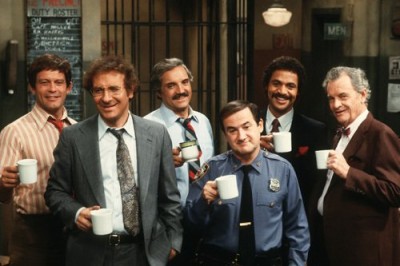| Reviews & Columns |
|
Reviews DVD TV on DVD Blu-ray 4K UHD International DVDs In Theaters Reviews by Studio Video Games Features Collector Series DVDs Easter Egg Database Interviews DVD Talk Radio Feature Articles Columns Anime Talk DVD Savant Horror DVDs The M.O.D. Squad Art House HD Talk Silent DVD
|
DVD Talk Forum |
|
|
| Resources |
|
DVD Price Search Customer Service #'s RCE Info Links |
|
Columns
|
|
|
Barney Miller - The Complete Sixth Season
Long before Seinfeld, Barney Miller truly was a show about nothing. Set in the second-floor detectives' squad room of New York City's 12th precinct (in the vicinity of Greenwich Village), Barney Miller was a sitcom where nothing much ever seemed to happen - its stagnant atmosphere was part of the joke. The show was like a stage play. Only occasionally did it venture into Captain Barney Miller's (Hal Linden) adjacent office and, after a couple of first-season episodes, rarely did it wander outside: according to the IMDb, just 13 of its 168 episodes have scenes outside the police station, and none in Season Six. There were no episodes centering on Barney's home life, no episode where its cast of characters found itself stranded in a cabin the mountains. No episode where Detective Wojciehowicz appeared as a game show contestant.
No, Barney Miller was something like a cross between Nat Hiken's hilarious early-'60s sitcom Car 54, Where Are You? and Beckett's Waiting for Godot. Like Car 54, Barney Miller authentically captured the essence of New York's ethnic underbelly, its concerns and preoccupations, and like Waiting for Godot an absurdist, uneventful existence inside a squad room, where instead of murderers and rapists its cops were more likely to contend with petty criminals and oddball complainants: a middle-aged man caught stealing ladies' underwear, a lunatic convinced he's a werewolf, a husband charged with imprisoning his wife in the toilet to keep her from voting on election day. There's a reason why, in the show's opening titles, the first thing viewers see is a garbage scow rolling past the New York skyline (including the World Trade Center).
The Complete Sixth Season of Barney Miller, episodes from the 1979-80 season, find the series sorely missing two of its major characters, though the extremely high quality of the writing, almost exquisitely funny, compensates for these losses. Besides takes-life-as-it-comes Barney, the show also features Ron Harris (Ron Glass), an upwardly mobile, black Republican and full-time narcissist; Polish-American Stanley "Wojo" Wojciehowicz (Max Gail), a well-meaning and sweet-natured but hopelessly insecure and naïve cop who's anything but streetwise; pedantic, sardonic Detective Dietrich (Steve Landesberg), whose non-sequiturs frequently leave the squad room nonplussed; and short, stocky Officer Carl Levitt (Ron Carey), an eager-beaver cop. Many others characters appear on a semi-regular basis, most notably old-school Chief Inspector Frank Luger (James Gregory), whose approach to police work suggests he thinks it's still 1947.
Conspicuously absent from Barney Miller's sixth season are two favorite characters: deadpan detective Philip K. Fish (Abe Vigoda), who looked like he absent-mindedly wandered off a stage production of Detective Story; and inveterate gambler Nick Yemana (Jack Soo, born Goro Suzuki, in San Francisco), who resembled a basset hound and talked like a nightclub comic at a 4:00 AM performance.
Vigoda always seemed to be a part of Barney Miller but in fact his character retired from the force at the beginning of season four, though he continued play Fish on Fish, a not-bad spin-off. He wasn't in a lot of season three episodes, and though he returned twice for one episode each in seasons four and seven, in all he was actually in fewer shows than semi-regular James Gregory. (In one of the great, possibly apocryphal examples of showbiz chutzpah, at the peak of Vigoda's popularity as Fish, his manger reportedly demanded the name of the show be changed to "Fish & Barney." Not even "Barney & Fish.")
Jack Soo left the series about a third of the way through season five after being diagnosed with esophageal cancer. He died in January 1979, with a touching tribute episode airing at the end of that season.
Steve Landesberg and Ron Carey tried hard to fill their shoes. Carey's obsequious cop was a fairly standard sitcom character and Carey plays him that way, but Landesberg's was a true original, an unflappable existential intellectual whose dry wit, which often goes unnoticed by his colleagues, was the source of many of the show's biggest laughs. In one early sixth season episode Barney brands Dietrich's responses as pedantic. Moments later when Barney asks him, "How's the coffee?" a hurt Dietrich's deadpan response is, "How the hell should I know?"
Barney Miller was created by Danny Arnold (of My World and Welcome to It and That Girl fame), along with Theodore J. Flicker, best-remembered for his great satire The President's Analyst (1968). Flicker co-authored the pilot, and in so doing was created as co-creator, though his later involvement with the series after that is said to have been minimal. Arnold, a former editor, famously hated shooting the show "on tape before a live studio audience," as had become commonplace with '70s sitcoms like All in the Family and Lotsa Luck. But Arnold circumvented this by stubbornly shooting episodes like mini-movies: lighting and fine-tuning the writing and performances and editing of each scene one-at-a-time, studio audience be damned. Instead of shooting a half-hour episode in 45 minutes or an hour; the taping of a Barney Miller show often dragged on into the middle of the night.
The results were a sitcom like no other. It had a unique attitude of unfazed tolerance toward minor vices and raving lunatics, an acceptance of working girls and flamboyant gay couples, an attitude that would be influential more to later hour dramas like St. Elsewhere, The Practice, and ER rather than other sitcoms.
The confined nature of the show, the fact that it almost never leaves the main squad room, becomes an asset, with its stale air you can almost smell (of Marlboro reds and Nick's famously awful coffee) and a claustrophobic disorganization forcing disparate types of all races and ethnicities into close contact.
A sampling of episode descriptions will give those interested in the series some idea of its strange charm: "The 12th Precinct plays host ... to a man who claims to be Jesus Christ ... a Catholic priest who mislaid one of his novitiates in the fleshpots of Manhattan ... a man [claiming] he will burst into flames at any moment, a woman [claiming] that her husband has been replaced by a robot," etc.
Season six guest stars include George Murdock, Kenneth Tigar, Phil Leeds, Sal Viscuso, Bruce Kirby, James Cromwell, Diana Canova, Jeff Corey, Peggy Pope, Jack Kruschen, Stefan Gierasch, A Martinez, Kay Medford, Arthur Malet, Oliver Clark, Michael Tucci, Leonard Frey, Richard Libertini, David Paymer, Leonard Stone, Peter Hobbs, Allan Miller, and David Clennon.
Video & Audio
Barney Miller - The Complete Sixth Season presents all 22 episodes on three single-sided, dual-layered discs. The show, being filmed on tape, is only going to look so good, but the full frame image isn't bad at all, better than I would have imagined. A mini-episode guide with plot summaries and original airdates is included. There are no subtitle or alternate language options, though the disc is closed-captioned, and there are no Extra Features.
Parting Thoughts
From a production standpoint Barney Miller may initially appear dated, but it's as funny, fresh, and hip today as it was when it was new. Highly Recommended.
Stuart Galbraith IV is the Kyoto-based film historian and publisher-editor of World Cinema Paradise. His credits include film history books, DVD and Blu-ray audio commentaries and special features.
|
| Popular Reviews |
| Sponsored Links |
|
|
| Sponsored Links |
|
|
| Release List | Reviews | Shop | Newsletter | Forum | DVD Giveaways | Blu-Ray | Advertise |
|
Copyright 2024 DVDTalk.com All Rights Reserved. Legal Info, Privacy Policy, Terms of Use,
Manage Preferences,
Your Privacy Choices | |||||||















